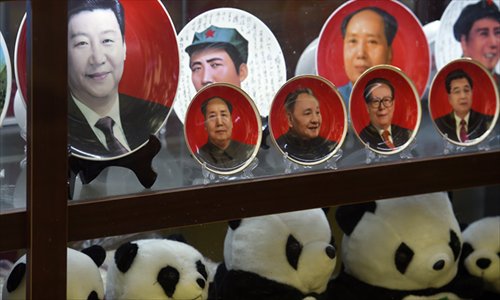
Decorative plates featuring Chinese leaders (from left to right), incumbent President Xi Jinping, Mao Zedong, Deng Xiaoping, Jiang Zemin and Hu Jintao are seen above a row of pandas in a shop window in Beijing on Monday. Photo: AFP

The fourth plenary session of the 18th Central Committee of the Communist Party of China (CPC), the first such meeting dedicated to the theme of "rule of law," started Monday in Beijing.
The four-day meeting, which includes some 200 members of the CPC Central Committee, is widely expected to be a landmark event that sets the tone for the CPC to promote the rule of law in China in a comprehensive way, observers said.
No details about the meeting were released on the first day of the closed-door discussion. But it is expected to be concluded with a draft decision deliberating "major issues concerning comprehensively advancing rule of law," the Xinhua News Agency reported on Monday.
Seldom has any other political concept been assigned the same gravity as has the rule of law, Xinhua commented, noting it is "the cornerstone of the modernization of China's state governance and national rejuvenation."
Law professionals, government officials and most Chinese people expect this top political meeting to yield guidelines and reform measures to advance the rule of law, build a more independent and transparent judicial system, a clean government and ensure well-rounded protection of human rights, Chen Weidong, a law professor with the Renmin University of China, told the Global Times.
Since the 18th CPC National Congress in late 2012, when the new leadership took office, a series of judicial reforms have been implemented.
The re-education through labor system that was used to lock up minor offenders was abolished last December. The system was strongly criticized for lacking a legal basis and being misused by local officials to deal with disputes.
"Abolishing the system is a big step to ensuring human rights, respecting the law and limiting officials' power," Chen said.
The independence of the judiciary was enhanced by a pilot program in which local courts were administered by higher-level judicial bodies rather than local governments, as stated in the decision of the third plenary session of the 18th CPC Central Committee last year.
Tian Wenchang, director of the Criminal Law Committee of the All-China Lawyers Association, told the Global Times that lawyers have pinned their hopes on the pilot program being expanded nationwide after the fourth plenum.
If local courts could financially be separated from local governments, the courts will be more just and independent and won't face interference by local officials, Tian said.
"What people expect and the essence of the rule of law is to reject the rule of man," said Sun Xiaoxia, dean of the law school at Fudan University.
"An obsolete 'above-the-law' privilege mentality remains among some Party and government officials … with unchecked power turning into a hotbed for corruption," Xinhua said.
In the nationwide anti-graft campaign, more than 50 provincial-level officials have been removed from their posts and over 700 officials have been investigated since the 18th CPC National Congress, the China News Service reported.
Sun said that President Xi Jinping's remarks that "Power should be restricted by the cage of regulations" are parallel to the rule of law.
"The fourth plenary session of the CPC Central Committee can be viewed as the second phase of the anti-corruption campaign," Julian Evans-Pritchard and Mark Williams, economists at Capital Economics, a London-based macro-economic research company, said in a research note e-mailed to the Global Times.
The research note said the leadership plans to institutionalize stronger oversight over officials and reduce the number of opportunities for corruption. "The primary goal is to try and ensure that Party and government officials toe the line and do not abuse their power," it said.
Not only the judicial system, but government interference in the market economy has been and will continue to be reduced, said analysts.
Since March 2013, the central government has scrapped or decentralized 632 administrative approvals and another 200 administrative approval processes will be scrapped within this year, Xinhua said.
Jiang Jie contributed to this story



